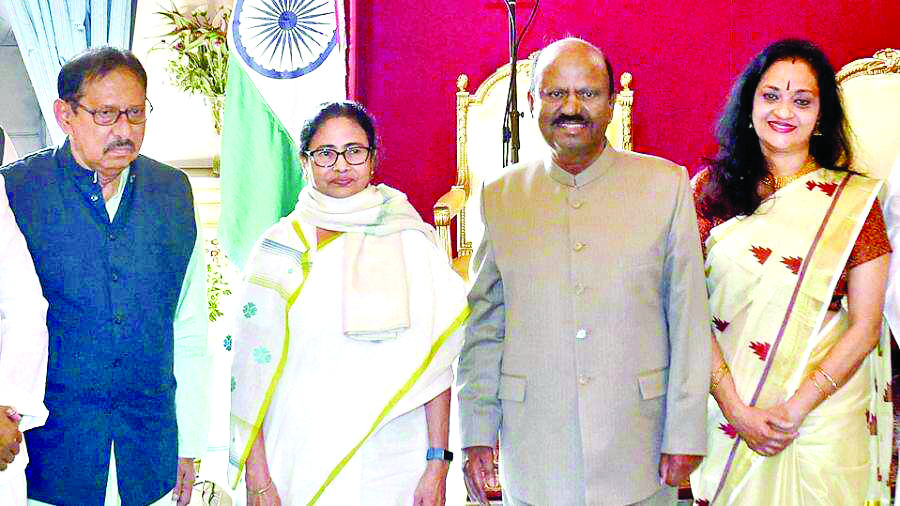Baishali Mukherjee (Kolkata)

Governor Bose & Banerjee (left)
Control of west bengal’s 31 state-run universities by appointing vice chancellors of choice continues to be a bone of contention between the ruling Trinamool Congress (TMC) government and the state’s Governor, C.V. Ananda Bose, ex-officio chancellor of all state universities. Since May, 22 interim VCs have been appointed by the governor. According to the Raj Bhavan (governor’s residence-cum-office), the names of interim VCs of nine other universities have also been finalised and appointment letters “will be issued soon”. These VCs have been selected ignoring University Grants Commission’s (UGC) search-and-select system of appointing vice chancellors, as well as the recommendations of the state education ministry. Some of the interim VCs appointed are non-academics and don’t have the qualifications mandated by UGC.
Moreover on September 1, a new notification from the governor’s office stated that the faculty and non-faculty staff members of all state universities are first answerable to the chancellor and then to the vice chancellor (VC), and also that the governor will be the vice chancellor of those universities which don’t have a VC currently. The notification also specifically states that any instruction from the state higher education department or state government will be valid only if the vice chancellor clears it.
Unsurprisingly on September 5, chief minister Mamata Banerjee lashed out at Governor Bose for his “interference” with the administration of state-run universities, stating that an “economic blockade” of universities to follow the governor’s directives is a possibility. In a first step on September 21, the state government has decided to pay the salaries of vice chancellors, teachers and other employees in state-aided universities directly into their accounts, instead of via the university’s account as per established practice.
West Bengal’s academy, including three faculty representative organisations — the leftist West Bengal College and University Teachers’ Association (WBCUTA), Jadavpur University Teachers’ Association (JUTA) and the All Bengal University Teachers’ Association (ABUTA) — expressed alarm over this stand-off between the governor — a Central government appointee — and the state government. WBCUTA president Subhoday Dasgupta, accused the ruling TMC and Raj Bhavan of undermining the autonomy of universities through “illegal interference”. ABUTA’s general secretary Goutam Maity says there’s been no change since the rule of the CPM-led Left Front government when the teachers’ community and VCs were told that their remuneration was dependent upon the pleasure of the state government.
In this connection, it is pertinent to note the CPM (Communist Party of India-Marxist)-led Left Front government which uninterruptedly (mis)ruled West Bengal for 34 years (1977-2011), levelled down the state’s once envied education system through persistent interference and by giving a free run to its mixed-up intellectuals, youth wing and apparatchiks to run amok within the state’s higher education institutions. In the process, Bengal’s higher education institutions, which right up to the 1970s were renowned countrywide for scholarship and research, were run into the ground.
Against this backdrop, there were great expectations within West Bengal’s intelligentsia and academics after the Mamata Banerjee-led TMC routed the Left Front government in the summer of 2011. But these high hopes have evaporated. Instead of introducing polar opposite economic, social and education policies, Banerjee has replicated the Left government by continuing to neglect primary-secondary and higher education in the state even as TMC’s Chhatra Parishad (youth wing) has been given a free run to take on entrenched CPM-affiliated teachers and students’ unions.
Meanwhile with teachers recruitment in school education at a standstill because of court orders following interference in TET (teacher eligibility test) by top TMC ministers in a major scam, because of insufficient budget allocations for higher education the state’s 433 undergrad colleges have 13,547 full-time professors against the sanctioned 30,000. According to informed academics in Kolkata, with four-year undergrad courses introduced under the National Education Policy (NEP) 2020, Bengal will need an additional 15,000 full-time professors. Yet instead of recruiting full-time faculty, the government has resorted to appointing part-time professors paying Rs.100-300 per class. As a result, youth are losing confidence in the higher education system.
Comments Partha Pratim Roy, general secretary of JUTA: “In the ongoing tussle, higher education institutions are being rendered helpless. Under Raj Bhavan rule, gag-orders on university academics banning them from criticising policies of the state and Union government are imminent. The state government and the governor must keep their focus on improving the academic environment and respecting institutional autonomy which is critical to ensure quality education.”
Meanwhile, in the stand-off between the governor and the state government, West Bengal’s once hallowed colleges and universities are caught in a downward spiral.
Also read: West Bengal: Governor discusses academic and administrative issues with interim VCs























